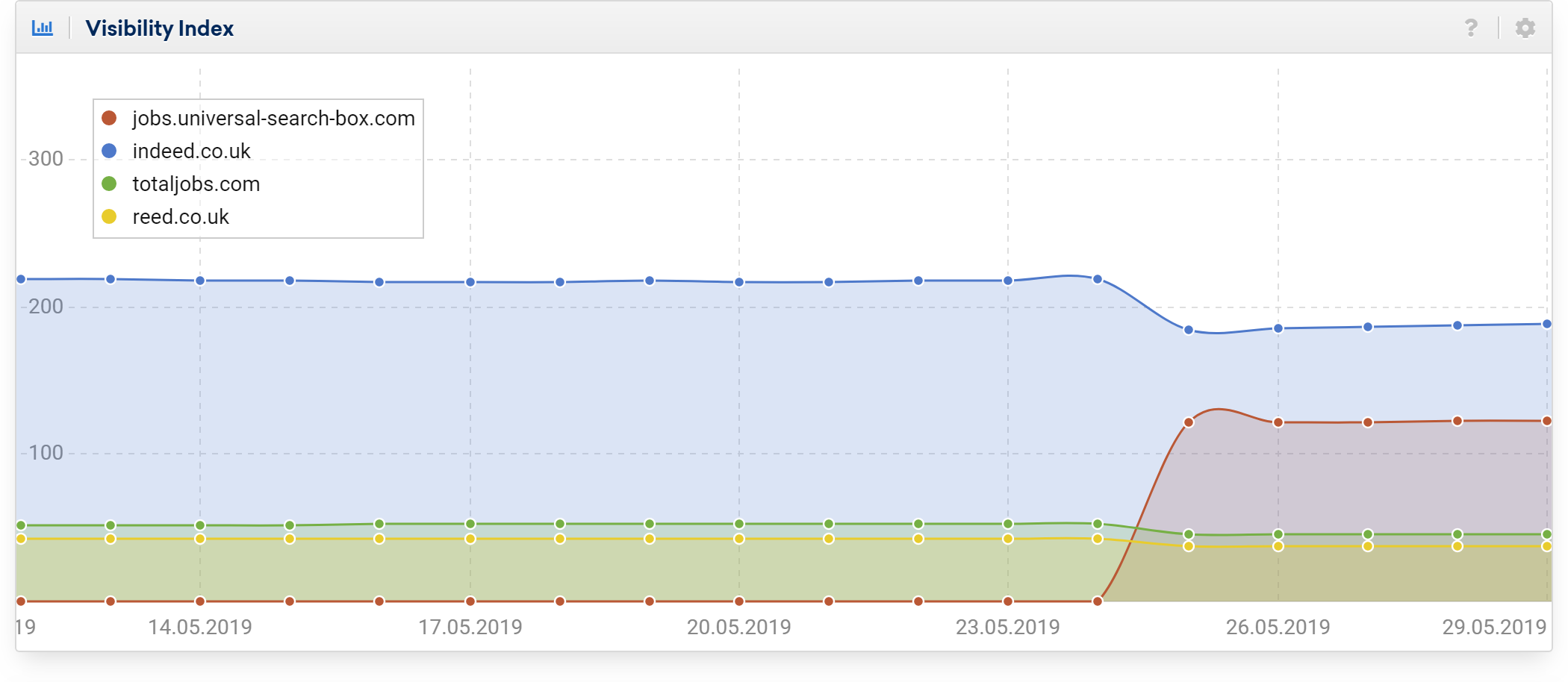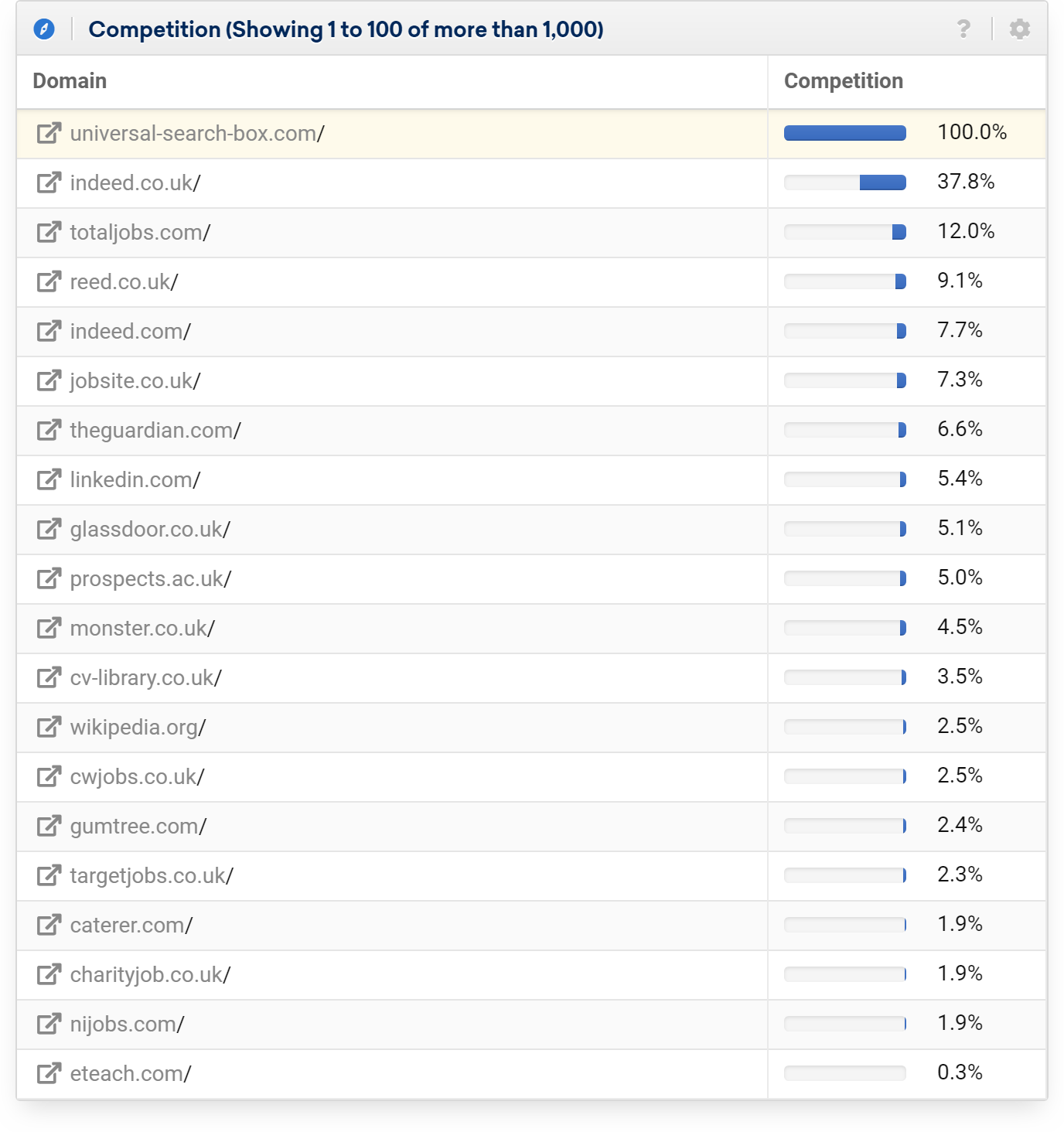Almost exactly one year ago (16th July 2018), Google launched it’s job platform in the UK. It’s now a regular and stable feature in job search results so we’ve started to measure its visibility in Google. The surprise? Google Jobs is now the second largest job market in Google UK. What it is, what impact it has and what to do, is explained in this article.
This integration of job information displaces an organic result. If there were 10 organic results before, today there are only 9, plus Google Jobs. The most curious thing is that unlike other integrations (news, videos, etc.), when the user clicks on the result, it does not access the website where the offer is, but remains within the Google product.
Here’s an example from Google.co.uk:

In 91% of all the results we found, the integration of Google Jobs is positioned first. In 8% of cases in second position and 1% between third and seventh position.
Keywords: Quality instead of quantity
As of today (29.05.2019), the Google Jobs integration is ranking for 8149 keywords from the one million that we track on a daily basis. The relevant thing here is not the number of keywords but the total search volume that those keywords have.
With only 8149 keywords ranking, the visibility of Google Jobs is over double that of totaljobs.com who has 316,401 keyword positions.
The keywords generally fall into one of three categories:
- Job search: Many keywords are easily categorised as being related to searches for job ads. Examples: job offers, jobs London, medical assistant wanted, bar job Ipswich.
- Professions: The box integration also appears in many job titles and training searches. Examples: pr assistant, forklift operator, virtual teacher.
- Company names: sky vacancies, coke cola careers, , etc. (they even position themselves #1 for “reed agency” with offers from other competitors … apparently what’s going on in Brussels does not interest them.)
A list of all the keywords will be found in the Toolbox. Data used is from 28.05.2018
Visibility: The second largest employment exchange in Google, overnight
Since the Google Jobs integration displaces an organic position, we have assigned that position to it within the toolbox, just as we do with Maps, Images and News. It allows us to compare the market share with other websites.

The integration of Google Jobs in our data makes it clear that other sites don’t compare favourably. The Jobs box is the second biggest site in terms of visibility.
As we discussed above, it outperforms all other job boards except indeed.co.uk. Since Google Jobs is positioned in the top positions, this also reduces the market share of competitors.
The biggest competitors to the Job box integration are as follows:

In Germany and Spain, almost exactly the same thing happens. In France it is barely seen and continues in its trial period. In Italy there is still no evidence.
Data source: Currently job-platforms. Next, company websites
In the blog post announcing Google Jobs in the UK, Google emphasises the close cooperation with many major job platforms. And indeed, most of the job advertisements currently come through these job boards. Google pulls them together as a meta-search engine, trying to de-duplicate and display the entries as best as possible.
And yet, it takes little imagination to realise that these job portals are just the stepping-stone (no pun intended!) The definition of structured job ad data has been online for some time and Google even provides a Push-API for those URLs. Google wants to get directly to the source and get job ads directly from companies in the future, not through the “middlemen” of job platforms.
Conclusion
The launch of Google Jobs should not surprise anyone. And yet, Google Jobs will significantly change the momentum in the market. Job boards that are currently largely living off their organic traffic will have a harder time in the future.
If you believe the numbers on Similarweb, at Indeed.co.uk around 41% of visitors are via organic search but only about 21% for Stepstone.de who, interestingly, keeps out of data sharing for Google Jobs. If they succeed, providers from other verticals will have a role-model for dealing with Google’s demand (the prisoner’s dilemma) for structured data.
